#the mythological cycle
Text
90% of the time I'm like "the only reason why the medieval Irish material seems bizarre is because it isn't taught as part of the standard humanities curriculum -- Greek Mythology is just as bizarre, you're just USED to it, stop reducing this stuff to Lol That's So Weird", but then I do have to be like. "Anyway the postulated father god of the postulated pre-Christian Irish pantheon, if ever such a thing existed in a uniform way, creates a zombie apocalypse in one text that allows him to become king of Ireland and his wife is a crow (part time) that commits crimes and castrates a Viking warlord (who has a really messy family life btw). He also has a xylophone made out of corpses in another text." and I have to be like. "Okay, so maybe the Irish texts ARE a little bit. Out there. On occasion."
#for what it's worth though there's still a REASON for these things#the scribes weren't putting them in because Lol Funny#but also...yeah.#Zeus could never#irish mythology#the mythological cycle#the dagda#i should clarify: they weren't JUST putting them in because Lol Funny
171 notes
·
View notes
Text
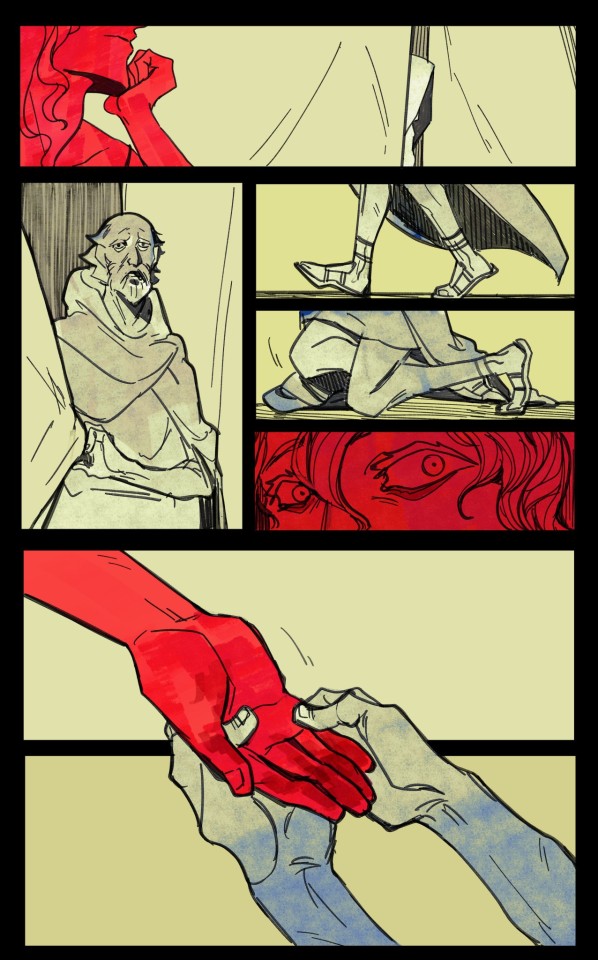
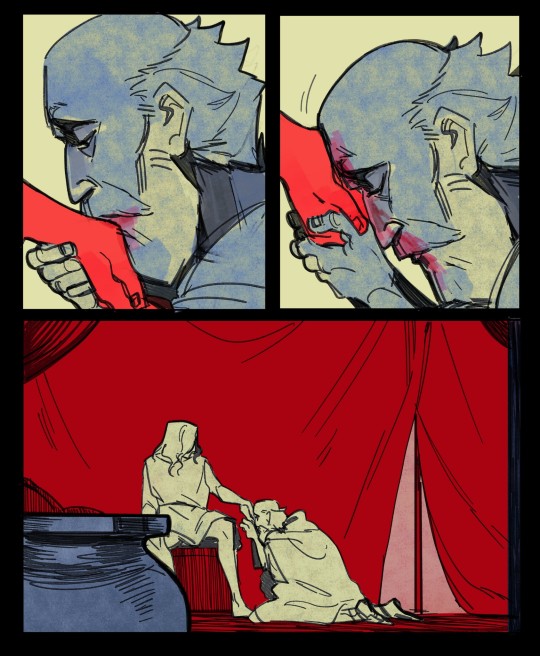
I have endured what no one on earth has ever done before
I put to my lips the hands of the man who killed my son.
#art#digital art#tagamemnon#the iliad#iliad#achilles#priam#greek mythology#epic cycle#also just realized i drew the wrong hand whoops#listen i really wanted to draw the thumb
12K notes
·
View notes
Text
more people need to know about irish mythology. it's just balls to the walls insane. if you thought greek mythology was wild let me introduce you to:
nessa and her 12 gay dads
queen medb cheating on everything and everyone, starting a war over a cow, ruining innumerable lives and then getting killed by cheese
fionn gets raised by 2 random lesbians
fionn kills a guy for stealing his girlfriend, drops the magic healing water several times on purpose
oisín goes to live in the immortal fairy land with his immortal fairy wife, misses ireland, comes back to visit, falls off his horse and fucking dies (may or may not have gotten in a fight with saint patrick before dying)
fuck them kids, they're swans now
guy accidentally gets job of "being the king's dog" at age 5, changes name to dog
3K notes
·
View notes
Text
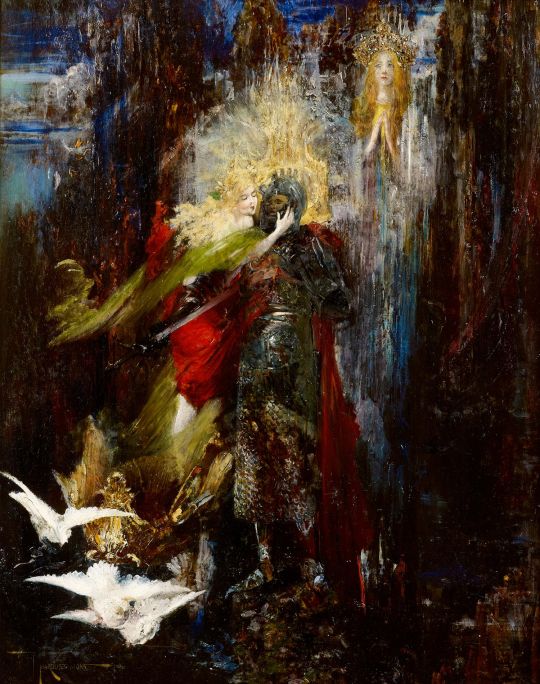
The Apparition of the Grail to Percival, Pinckney Marcius-Simons, ca. 1904
#art#art history#Pinckney Marcius-Simons#mythological painting#Arthurian mythology#Arthurian legend#Arthuriana#Grail Cycle#Holy Grail#Sir Percival#illustration#Richard Wagner#Parsifal#Symbolism#Symbolist art#American art#20th century art#oil on panel#private collection
729 notes
·
View notes
Text
Here's something funny that I can't believe I've never shared before.
So I was scrolling through the Hector of Troy tag and I stumbled upon a post referring to him as the "son of Troy".
Now, in it of itself that's all fine and dandy, but it reminded me of something.
In Italian, the city of Troy is referred to as Troia.
The word Troia just so happens to be a mixture of the words bitch and slut.
So yeah, you just end up with these marvelous expressions:
"Hector, son of Troy" becomes "Ettore, figlio di Troia" = "Hector, son of a Bitch"
"Trojan War" becomes "Guerra di Troia" = "Slut War"
"Paris, prince of the city of Troy" becomes "Paride, principe della città di Troia" = "Paris, prince of the city of the Slut"
And I could go on.
Man, do I love my language.
#trojan war#the iliad#epic cycle#greek mythology#ancient greek mythology#hector of troy#paris of troy#tagamemnon
2K notes
·
View notes
Text
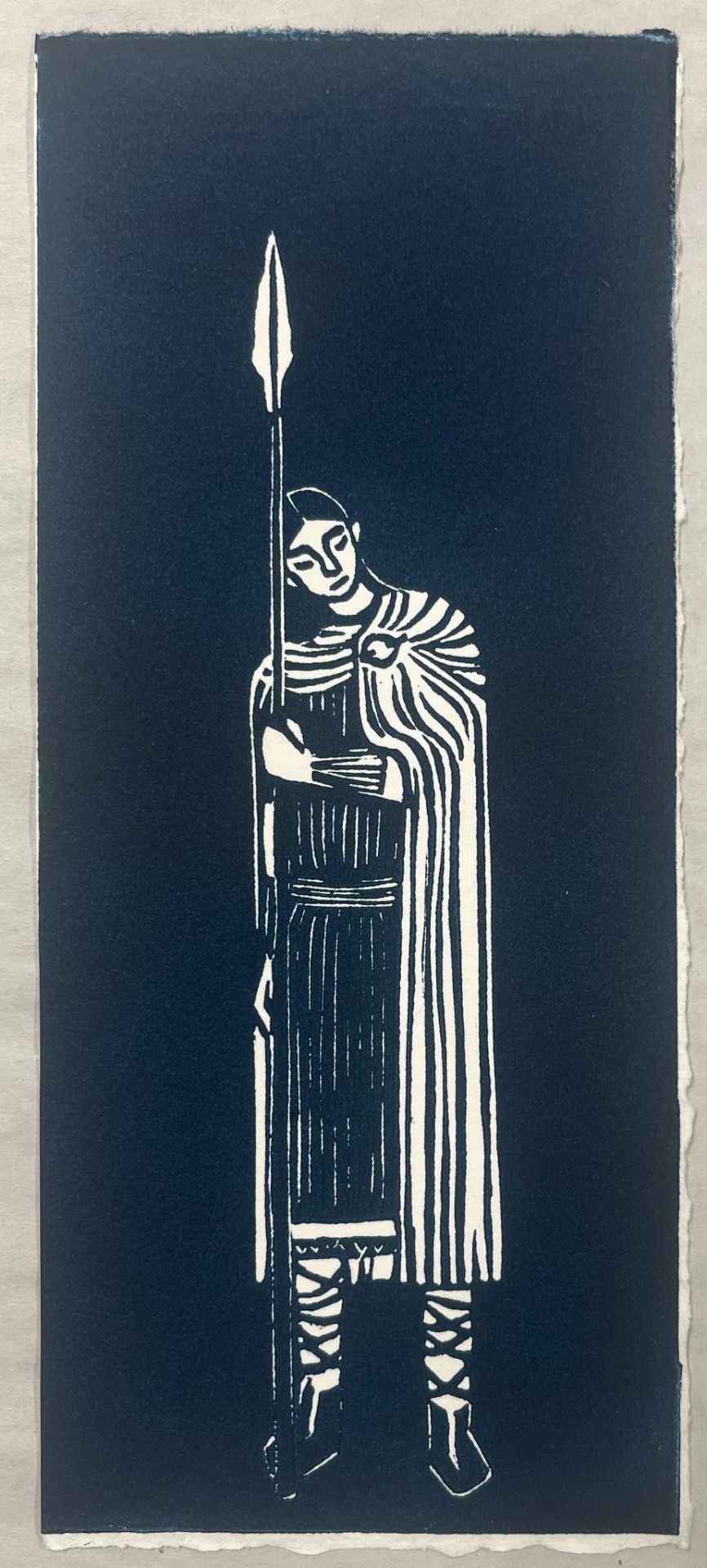
hi more ulster cycle art based on this passage: “From the Monday after the feast of Samain at summer’s end to the Wednesday after the feast of Imbolc at spring’s beginning, Cúchulainn never slept — unless against his spear for an instant after the middle of the day, with head on fist and fist on spear and the spear against his knee” - táin bó cúailnge tr. thomas kinsella
#i feel like when i read the tbc i constantly seesaw back and forth between “haha he’s only 17” and “oh my god he’s only 17”#this is one of the latter moments#my art#art#me#ulster cycle#tain bo cuailnge#cu chulainn#linocut#irish mythology
270 notes
·
View notes
Text
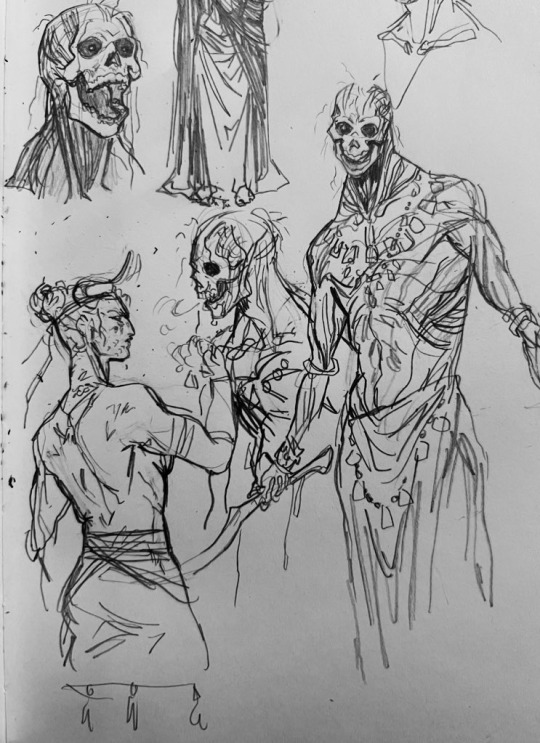

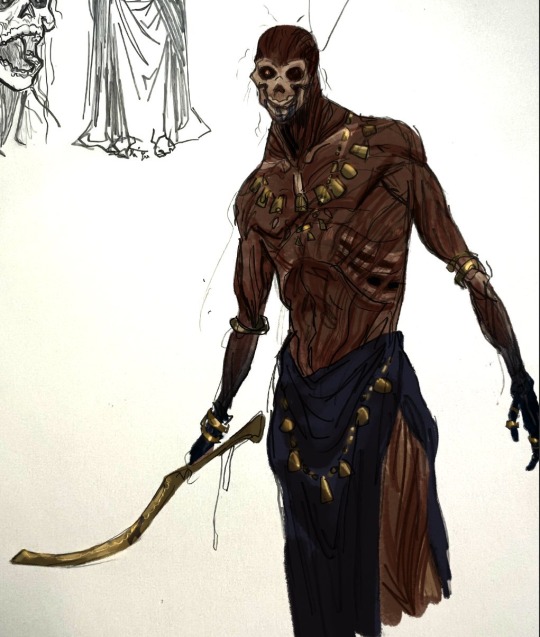
Mot, Canaanite god of death, pestilence, sterility.
His clothes are rotted fibre and raiment tarnished gold. His hands are stained with oil, flesh shrunken and dried by the sun and salt.
269 notes
·
View notes
Text
Did you guys know that Admetus' son Eumelus was fighting in the Trojan war?
Alcestis: I worry about Eumelus, it's been 10 years. I fear we will never see him again.
Admetus: Don't worry dear, I'm sure Apollo is watching over him, like he always watched over our family.
Meanwhile in Troy
Apollo: *kills dozens of Greeks with the plague. Constantly protects Hector and makes sure he can kill as many Greeks as humanly possible. Helps Trojan princes kill Greeks' best warriors*
Eumelus after seeing all of this: mom come pick me up I'm scared
But all jokes aside
Can you imagine Eumelus coming back home and seeing Apollo visiting his parents?
He sees Apollo being loving and kind to Admetus, he sees Apollo being gentle and friendly with Alcestis. He saw that his entire childhood, he saw the god of music, knowledge, light and poetry.
But now, after the war, Eumelus can't help but only see the god of plagues, the destroyer of men. He can't forget the horrible smell of disease and rotting human flesh, he can't forget what happend in Troy.
Obviously, it's not only one sided. Eumelus was fighting in this war, he helped destroy the city, he does have blood on his hands. And that could make him even more terrified of Apollo. Because he helped destroy the city that was under Apollo's protection.
What if one of the man he killed had Apollo's favour like Hector did? What if the only thing standing between him and Apollo's rage are his parents? What if Apollo is waiting for them to pass away to punish Eumelus? He can be patient, he's a god after all, he have all the time in the world. What if Pherae (their polis) will lose Apollo's favour with Admetus' death? What if Apollo will send a plague upon them as soon as Eumelus takes his father's throne? He can't stop thinking about all of this every time he sees Apollo.
I also like to think that Apollo did protect Eumelus despite being on the other side of the war. After all, Eumelus didn't die during the plage. He didn't die in the last battle despite being on the front line, inside of the Trojan horse. He made it home while most of the Greeks didn't.
He had and still have Apollo's favour, he just can't see it through his fear.
#Or at least I think he made it home#there is so little information about him it's hard to tell#But I didn't find anything about his death and from what I've seen was the king after Admetus so I guess he came back#I would be writing fanfiction if my English didn't suck so much#apollo#eumelus#trojan war#admetus#alcestis#tagamemnon#greek myths#greek gods#greek mythology#epic cycle
373 notes
·
View notes
Text
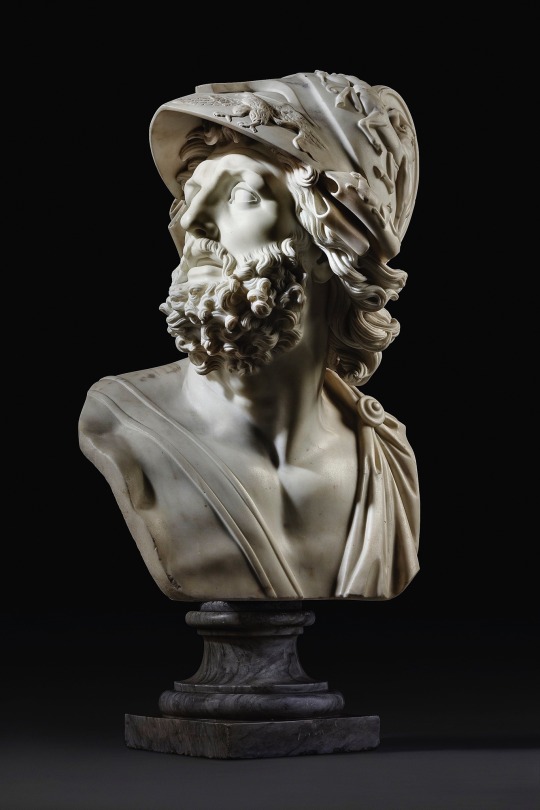
Over-lifesize bust of Ajax
After the antique, attributed to the workshops of Benedetto Boschetti
#ajax#bust#art#marble#benedetto boschetti#antique#trojan war#epic cycle#the iliad#iliad#greek mythology#europe#european#history#mythology#sculpture#sculptures#antiquity#classical antiquity#ancient greece#ancient greek
469 notes
·
View notes
Note
I have been trying to find an answer online but I can't quite find what I'm looking for, if you don't mind can you help provide some insight?
Basically my question is did the medival people of Ireland honest to god believe in pseudo historical texts like the Book of invasions and related traditions. Like they believed in 6 waves of people coming to ireland under Christian cosmology.
Or was this more of a literary tradition for generally understood to be fictional or not quite accurate stories?
So it's been. Months. But if it's any consolation, this DID thoroughly haunt me!
I also cleared it with a colleague of mine who does work on like. Medieval Irish conceptions of history, so it's been vetted by Someone Who Is Not Me, at least the rough outline (I am NOT showing them my Tumblr, god forbid.)
And...for the most part? Yeah. They did. They sometimes argued FIERCELY over little details, like the Tuatha Dé coming in a cloud of mist or whether or not they burned their ships, or whether they were doing it to get away from Lugh. They cited texts that they thought were particularly authoritative, like the Holiest of the Holies, the now-lost Cín Domma Snechtai, they refuted other scribe's suggestions, sometimes very aggressively. I mean, you have scholars into the 20th century believing in this, at least to some extent or another, like Eoin MacNeill in his Phases of Irish History (1919) or T.F. O'Rahilly in his Early Irish History and Mythology (1946). Obviously not in terms of like. The Tuatha Dé as a supernatural race of people, but in the sense of what might best be described as extreme euhemerization, using these medieval texts as a way of trying to unveil a lost Irish pre-history. (It goes without saying this is NOT my approach and not how most of us approach the field, but it was quite common decades ago.)
Geoffrey Keating, in the 17th century, would write his History of Ireland, which used LGE as one of its key pieces of evidence in his attempt to hit back against less than savory accounts by anglophone scholars, of Irish history. "LOOK at our history, LOOK at our glorious past, LOOK at what we can do." It's imminently sympathetic, honestly. (Though Geoffrey shouldn't be taken to be credulous -- he explicitly says that Cath Fínntragha, for example, was not to be taken as a true historical account.) There's a bit, perhaps slightly amusing by modern standards, in his prologue where he says, "Cambrensis [Gerald of Wales], who undertook to give a correct account of everything, appears to have received a medley of fables from some dunce or blind man, for he has said nothing of the conquest of the Tuatha-De-Dananns, who possessed Ireland one hundred and ninety-seven years, during which time nine kings of their nation rules the island."
This is a man who does, firmly, believe in what he's saying and in the veracity of the sources that he has. We also see LGE and the pseudohistorical scheme in general being adopted by Keating's contemporaries, such as Dubhaltach mac Fhirbhisigh (Leabhar na nGenealach) and Roderic O'Flaherty (Ogygia), some of the best scholars of their day and men who...this is my bias speaking, but I trust them. Especially Dubhaltach. I don't have my copy to hand, but the way he speaks about his sources, the way that he's willing to argue with them even as he includes them in his work...I believe him. Or. Let me rephrase that. I believe that HE believed in what he was saying, and I believe in his integrity as a scholar. They're men who absolutely have an angle! But they're men who are using the sources that they have to defend their country from some truly awful slander using the best materials they have at the time, as methodically as possible.
Charles O'Conor, one of the, in my opinion, crucially overlooked scholars of the 18th century, a man who the field owes a massive debt to for his activism and his large collection of manuscripts (some of which, through a story I'll tell sometime if anyone's interested, become the Stowe Collection), was skeptical, saying that Keating's work, "Is a most injudicious Collection; the historical part is degraded by the fabulous, with which it abounds. Keating was one of those laborious Readers, who, in making Extracts, do it without Selection or Discernment; and suchWorks (as the judicious Mac-Firbis observes -- ought never to be published." Personally, while I appreciate boosting Dubhaltach and his work, I think he's too harsh on Keating. It's very easy to judge someone's scholarship when you're living a century ahead of them. He is much more skeptical than Keating, trying to compare native sources up against other contemporary histories of Europe, but he DOES still use LGE as a vital source -- he doesn't discount it or its invasion scheme entirely. He is still very much treating it as a historical document, albeit one that he doesn't fully believe in. (Especially since he's kind of fighting with James MacPherson, of Ossian fame. Because apparently getting into massive public debates with people whose work is enjoying a lot of popularity and that we think involves shoddy research is a time honored tradition in the field.)
But there is a reason why it gets picked up, even into the 20th century, because when you've had your history continually belittled and marginalized, when your language has been driven to the point of near extinction, when you are constantly told that you don't HAVE anything worth being proud of, not compared to the Grand History of England or the classical tradition, that you're a nation of barbarians and beggars...of course you want to believe in it. Of course you want to believe that you can salvage SOMETHING. Especially since these are your ancestors saying it. Your ancestors, reaching across this seemingly insurmountable chasm of time, telling you "look, this is your history." Do I think everyone in medieval Ireland agreed with it? Probably not. There was probably at least one person who was like "well...do we KNOW, though?" In the same way as there were very likely people who thought "King Arthur...did he exist?" Or those oddballs in the modern day who claim the Roman Empire didn't exist. There are always going to be people who are a little skeptical, even of what are the generally accepted truths of a certain time period, but I would say that in general? The trend we see is broad belief, because this is the best historical source that people had for centuries -- they had no reason to strongly doubt it, even if they argued over the details.
#geoffrey keating#charles o'conor#dubhaltach mac fhirbhisigh#the mythological cycle#lebor gabála érenn#irish mythology
40 notes
·
View notes
Text
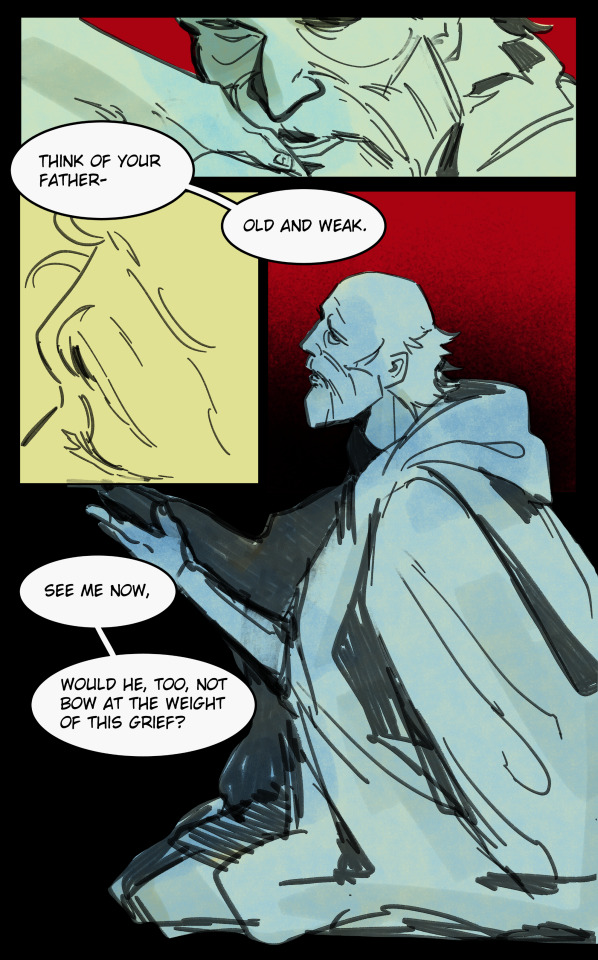



Suppliant my children's murderer to implore,
And kiss those hands yet reeking with their gore
(2/2)
8K notes
·
View notes
Text
did y'all knew that there's a fish whose scientific name is
Astyanax Aeneus

and there's also other species of Astyanax
#astyanax#tagamemnon#greek mythology#iliad#i'm so normal about it#heh#scamandrius#trojan war#epic cycle
125 notes
·
View notes
Text

Launcelot at the Shrine of the Holy Grail: Study for the Angel of the Holy Grail, Dante Gabriel Rossetti, 1857
#art#art history#Dante Gabriel Rossetti#medievalism#Arthurian legend#arthurian mythology#Holy Grail#Grail Cycle#Arthuriana#religious art#Christian art#angel#angels#figure study#drawing#pen and ink#Pre-Raphaelite#Pre-Raphaelite Brotherhood#pre-raphaelisme#British art#English art#19th century art#Victorian period#Victorian art#Birmingham Museum and Art Gallery
1K notes
·
View notes
Text
Classicstober Day 1- Cassandra

This challenge is going to be my excuse to start drawing on paper again.
#myart#my art#cassandra#greek mythology#epic cycle#trojan war#the iliad#the illiad#cassandra of troy#classicstober#classicstober23#traditional drawing#wow I just love working with my cheap white pan and my half dry alcohol markers <3
188 notes
·
View notes
Text
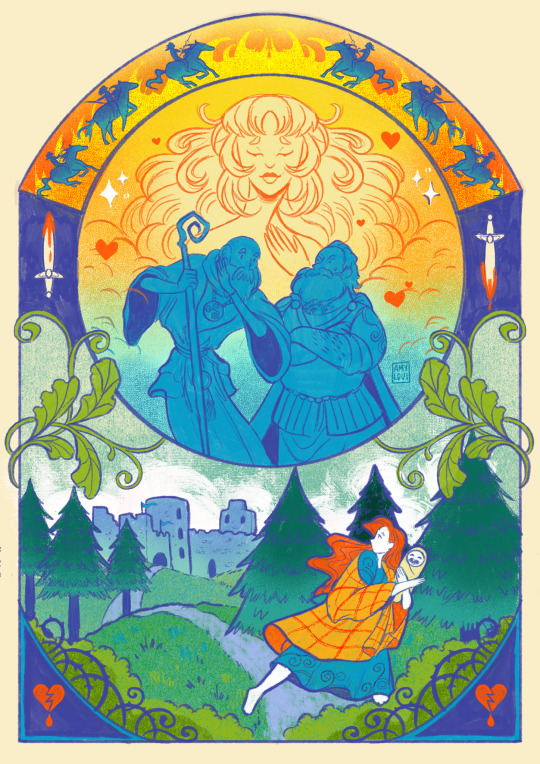
Part One of a new illustration series focusing on the tragic tale of Deirdre and Naoise.
Fedlimid gets some bad news, a baby is born and Leabharcham heads away for safety.
This is my March Postcard Club illustration! If you’re interested in getting a print in the post (along with new postcards each month) then you can sign up here!
#irish mythology#irish folklore#deirdre#illustration#artists on tumblr#amylouioc art#celtic mythology#irish myths#fantasy illustration#irish#ulster cycle#postcard
137 notes
·
View notes
Note
Hi! I really want to read the vulgate cycle but I have a hard time staying focused when reading it. Are there any sections of the vulgate that are not as important to the understanding or able to skip? Thank you so much for making all these stories accessible and thanks for your reply :))
Hello my friend! This is a great question and one I get a lot. The Vulgate Cycle is long and daunting, but I can help you navigate it!
Firstly, here is the full Vulgate Cycle PDF collection for everyone to read. Secondly, I'll summarize what you can do, and elaborate below a cut.
TL;DR
If reading a PDF, use CTRL+F to find your favorite character's name/stories.
If reading a physical copy, utilize the index (located at the very end of the Post Vulgate) to find them.
Discover chapters of interest from the summary page (also located at the very end of the Post Vulgate).
Skip The History of the Holy Grail and begin with The Story of Merlin or Lancelot I.
Now, let's break down the ways you can navigate the Vulgate Cycle step by step.
CTRL+F
This option will certainly be less effective if your favorite character is a prominent one such as Lancelot or Gawain as they appear a million times. However, if you want to learn more about someone else, say, the Lady of the Lake, you can search her up and find every instance of her appearance. Like so.
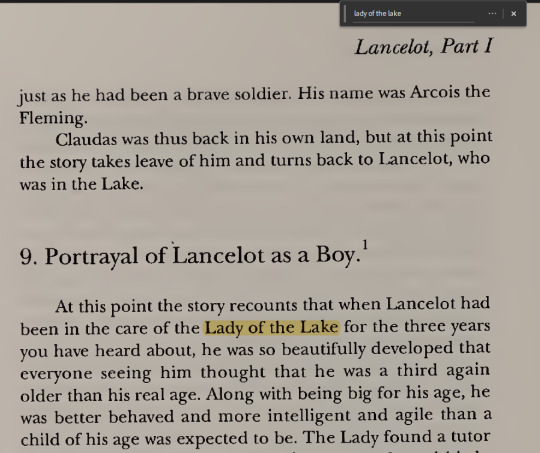
Index
In the very back of the final book of the Post Vulgate, there's an Index listing every named character [Ex: Gawain], location [Ex: Orkney Isles], entity [Ex: Holy Spirit], animal [Ex: Gringalet the horse], and language [Ex: Hebrew] mentioned in the entirety of the Vulgate Cycle. There you'll find a list of which book/chapter/page they appear in. Here are all the mentions of Gawain's horse in The Book of Merlin.

Chapter Summaries
Each book of the Vulgate Cycle has a Table of Contents with the chapter numbers and long, descriptive titles. That alone may give you an indication of what you want to read. However, at the back of the Post Vulgate, right before the Index, there's a list of every chapter in the Vulgate Cycle with a summary of events. That will give you more detail and may help you decide if you want to read in full.
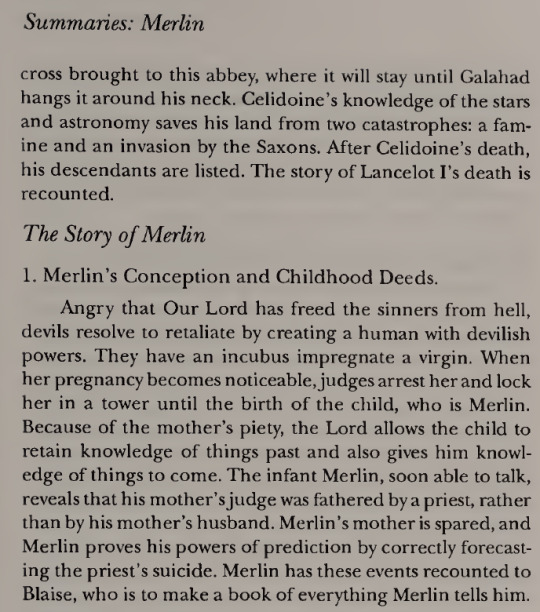
Skip
If it sucks, hit da bricks. The beauty of the Vulgate Cycle is that you don't need The History of the Grail or The Book of Merlin to understand what comes later. I enjoy them because History gives a ton of background to the religious themes the Grail Quest will eventually explore and sets up all the motifs way in advance and Merlin has the Orkney Bros as well as Yvain and Sagramore as kids which is fun. But the fact is you can begin with Lancelot I and you won't be lost. Lancelot I was written first, Merlin is a prequel, so it's optional, and the motifs of the Grail Quest are going to be heavy handed when you get there anyway without the added stuff from History. That's hundreds of pages you can skip if you want to! Norris J. Lacy, the head editor, and his translation team did a phenomenal job with footnotes throughout, so if a character off-handedly refers back to something, you can rely on them to leave a little note at the bottom for you to refresh your memory with. It'll even give you a chapter/page number if you want to refer back yourself. Here's a footnote referring to Agravaine's unnamed amie [his ladylove] who helped wing woman her sister to romance Gawain. That was 4 chapters prior to this moment.
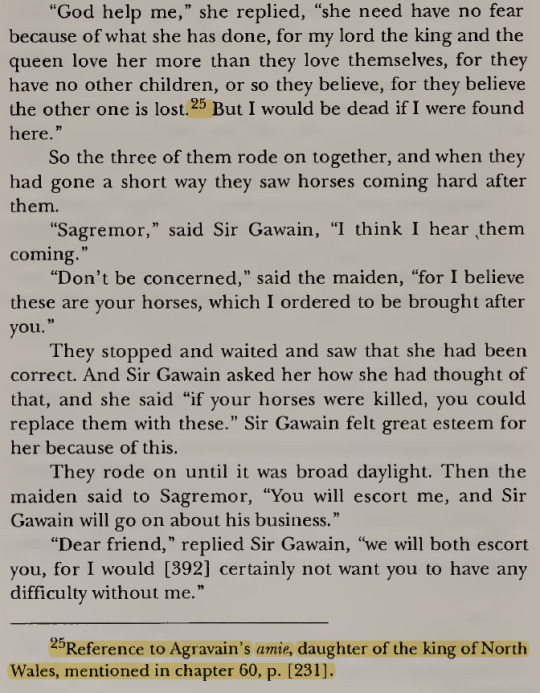
So there are plenty of ways to navigate the Vulgate Cycle and make it more digestible. That being said, it's translated so beautifully by Lacy and his team, that it reads like a modern novel. I have no doubt that once you get started, you'll become invested, and find it much easier to work through than you first thought. It's long-winded and character dense but it's fun. I do hope you're able to read it and understand why I love it so much! Thanks for this ask and I hope this helps. Have a great day!
#arthurian legend#arthurian legends#arthuriana#arthurian mythology#arthurian literature#the vulgate cycle#the vulgate#vulgate#post vulgate#quotes#resource#reading recommendations#my post#ask
70 notes
·
View notes